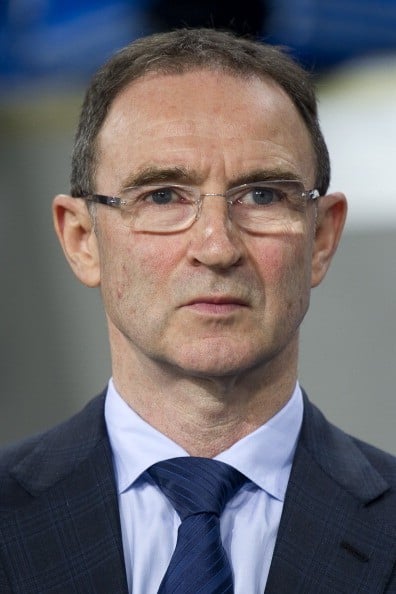Share this @internewscast.com
What is Martin O’Neill’s net worth?
Martin O’Neill is an Irish soccer manager and former player who has a net worth of $10 million. Martin O’Neill has long stood among the most respected and passionate figures in British and Irish football. As a player, he was a combative midfielder whose tenacity helped power Nottingham Forest through one of the most dramatic eras in English and European competition. As a manager, he built a reputation for galvanizing teams, punching above relative budgets, and blending pragmatism with motivational leadership. His managerial résumé includes spells at Leicester City, Celtic, Aston Villa, Sunderland, and the Republic of Ireland, often arriving in challenging environments and leaving with silverware or renewed belief. His legacy lies as much in his ability to inspire collective spirit and resilience in squads as in the trophies or qualifications he achieved.
Early Life & Playing Career
Martin Hugh Michael O’Neill was born on March 1, 1952, in Kilrea, Northern Ireland. He began his football journey in the Irish leagues before moving to England, where he signed for Distillery and then, in 1971, joined Nottingham Forest. At Forest, he played 285 league matches and scored 48 goals, becoming integral to the side that won the First Division title in 1977–78 and back-to-back European Cups in 1979 and 1980.
He also earned 64 caps for Northern Ireland between 1971 and 1984, scoring eight goals, and captained his country in major tournaments. Later in his playing career, O’Neill had spells at Norwich City, Manchester City, Notts County, Chesterfield, and Fulham before retiring around 1985 due to injury. His playing days, while successful, came before the era of huge player salaries, and reliable figures for his wages are not publicly available.
Transition to Management & Early Years
After retiring, O’Neill initially worked outside football before moving into management. His early jobs included Grantham Town (1987–1989) and Shepshed Charterhouse, before gaining recognition at Wycombe Wanderers. Between 1990 and 1995, he led Wycombe to promotion into the Football League and then into the third tier, a remarkable rise for the small club.
In 1995, he took charge of Norwich City, though his time there was brief. Later that year he was appointed manager of Leicester City, where he made his name by turning the club into a competitive Premier League side. Leicester won two League Cups under his stewardship, in 1997 and 2000, and regularly challenged stronger clubs despite limited resources.
Celtic Success
O’Neill left Leicester in 2000 to take over Celtic, one of his most successful managerial chapters. Over five years he won three Scottish Premier League titles, three Scottish Cups, and a Scottish League Cup, while also guiding Celtic to the 2003 UEFA Cup Final against Porto. His ability to restore Celtic’s dominance and challenge Rangers marked him as one of the most important managers in the club’s modern history.

Adam Nurkiewicz/Getty Images
Premier League & International Management
In 2006, O’Neill returned to the Premier League as Aston Villa manager. Over four seasons, he achieved three consecutive top-six finishes, stabilizing Villa as a competitive side. He later managed Sunderland between 2011 and 2013, working under tighter constraints, before taking over the Republic of Ireland national team in 2013.
With Ireland, O’Neill oversaw qualification for UEFA Euro 2016, including a famous win over Germany in qualifying. His team advanced to the round of 16 in the tournament, cementing his reputation for motivating squads to overachieve. He remained with Ireland until 2018.
In 2019, he briefly returned to Nottingham Forest as manager, but his stint lasted only 19 games before he was dismissed. That proved to be his final role in management.
Style, Philosophy & Legacy
O’Neill has been praised for his motivational leadership, man-management skills, and ability to instill belief in underdog teams. He has often emphasized team spirit and resilience over complex tactical systems. He has also been outspoken about modern football’s reliance on data, describing “expected goals” as “total nonsense” and questioning the role of sporting directors in interfering with managerial authority.
At Celtic, he is remembered as a transformative figure, while his Leicester and Villa teams are admired for punching above their weight. Though he never managed one of England’s “big six” clubs or the England national team, O’Neill is widely considered one of the most effective managers of his era.
Contracts & Salaries
While little is known about O’Neill’s earnings as a player, his managerial salaries reached notable levels:
At Leicester City, shortly before joining Celtic in 2000, he was earning about £18,000 per week, or nearly £1 million annually. Celtic lured him north with a package reportedly worth around £2 million per year.
As Republic of Ireland manager, O’Neill was estimated to be earning about €1 million annually under his first contract, with later reports in 2018 suggesting the figure had risen as high as €1.9 million per year.
Though these numbers fall short of the astronomical sums commanded by top Premier League managers today, they reflect his stature as a highly respected coach during his prime.
Later Life
O’Neill has since shifted to punditry, writing, and football advocacy. He published *The Changing Game: The Past, Present and Future of Football*, offering reflections on his 50 years in the sport and candid critiques of modern trends. He also serves as chair of the League Managers’ Association, championing the interests of coaches across the game.
Despite the disappointments of his final managerial roles, O’Neill’s enthusiasm for football remains undimmed. He continues to follow the sport closely, and his career stands as a testament to leadership, resilience, and a fierce love for the game.
All net worths are calculated using data drawn from public sources. When provided, we also incorporate private tips and feedback received from the celebrities or their representatives. While we work diligently to ensure that our numbers are as accurate as possible, unless otherwise indicated they are only estimates. We welcome all corrections and feedback using the button below.
(function() {
var _fbq = window._fbq || (window._fbq = []);
if (!_fbq.loaded) {
var fbds = document.createElement(‘script’);
fbds.async = true;
fbds.src=”
var s = document.getElementsByTagName(‘script’)[0];
s.parentNode.insertBefore(fbds, s);
_fbq.loaded = true;
}
_fbq.push([‘addPixelId’, ‘1471602713096627’]);
})();
window._fbq = window._fbq || [];
window._fbq.push([‘track’, ‘PixelInitialized’, {}]);






